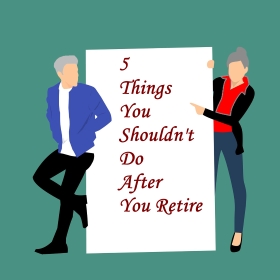5 things you shouldn’t do when you retire

When they’re nearing the age of retirement, most people tend to worry about one or more of the following things: How will I manage my (or my family’s) expenses once I retire? Will my family/my children/society give me the same respect once I stop working or will my value as a useful member of society diminish as a senior? What will I do with all the free time I’ll have after retirement – how will I pass my time? Will my health, mental and physical, start deteriorating once I retire?
Well, the good news is that retired life can be relaxed, stress-free, enjoyable, even exciting… but only if you’ve planned for it properly. When you retire you transition from one phase of your life to another. It’s like, after working hard all your life, after you’ve climbed a mountain taking work and family responsibilities in your stride, you’ve reached the stage where you now have to slowly climb down the other side of the mountain.
And that’s where the right planning plays a crucial role. It could make all the difference to the quality of your retired life.
Maybe, you’ve planned some smart investment options in advance that will bring you regular returns after you retire or have decided to work part-time, and perhaps you’ve already set aside enough savings for emergencies. That’s good. Being financially secure will certainly take a lot of the stress out of retired living.
But, while it’s important to plan well regarding what to do to maintain the kind of retired lifestyle you desire, you also have to be determined not to do certain things after retirement. So let’s see what these things are.
-
Don’t stop enjoying life

For many retirees their idea of enjoying life after retirement is getting up late, enjoying being their own boss, enjoying the freedom to do what they please when they please without having to worry about setting the alarm, rushing to reach the office in time each morning, having to ask for leave from work when they need it, etc.
But, after just a few weeks of this vacation-style living, of aimlessly drifting from day to day without anything to look forward to, such people invariably find themselves at a loose end, begin to feel that retired life is boring.
So why not draw up plans for activities that you believe will keep you happy each day after retirement? This could be taking up a new hobby or going back to an old one, joining a volunteer or spiritual group, or taking a class (the choice of classes offered online is limitless varying from poetry writing and history to learning a foreign language and programming for everybody, many of them free. Activities like these could add a new meaning to your life after you retire.

If you’re passionate about travel, make travel plans soon after retirement when you’re still healthy. If you cannot afford travelling to far-off destinations, pick interesting places closer to home. The Far East, Middle East, and South Asia have scores of places to choose from.
-
Don’t neglect your health
 Once you retire, you have no way of knowing how many years you have left. It could be ten, twenty, or even thirty years. You need to be in reasonably good shape to enjoy all those post-retirement years.
Once you retire, you have no way of knowing how many years you have left. It could be ten, twenty, or even thirty years. You need to be in reasonably good shape to enjoy all those post-retirement years.
Living a retired life doesn’t mean you have to sit on your backside, idling away your time, watching the world go by. Get up and get moving. Stay active, and you’ll stay healthy. Staying healthy will in turn help you add life to your years. Besides, staying active will also strengthen your bones and muscles and help you stay independent longer.
Ensure you eat simple, nutritious food at regular times. Depending on your physical condition, set a suitable daily exercise routine for yourself. Regular exercise helps our body release feel-good endorphins that keep our spirits up and make us feel more energetic.
Stay physically active by being busy around the house, taking up sports activities (cycling, swimming, brisk walking, aerobics) or engaging in community activities.
But, don’t forget that mental wellness is also a crucial part of staying healthy. As we grow older, having friends we can confide in and do things with minimizes the chances of being depressed, anxious, or lonely. Volunteer work as also leisure activities like reading, playing a musical instrument, painting, gardening, playing board games like chess, doing crosswords, enjoying outings with friends, strolling outdoors, and staying socially active are known to significantly reduce the risk of dementia.
-
Don’t stop caring about your appearance
 Retirement makes us more conscious of aging and growing old. While it’s a fact that we’ll never regain the looks we had in our youth, or even when we were in our fifties, that doesn’t mean we have to now neglect our appearance or how we dress.
Retirement makes us more conscious of aging and growing old. While it’s a fact that we’ll never regain the looks we had in our youth, or even when we were in our fifties, that doesn’t mean we have to now neglect our appearance or how we dress.
Retired people can still do things in style. Remember to wear sunscreen before spending time outdoors, continue taking care of your hair, teeth, and skin, and make it a habit to be presentable and suitably dressed. Knowing that you’re well turned out will boost your self-confidence and mood, and help you feel young-at-heart longer.
-
Don’t abandon love and romance
 As you grow older, it’s even more important to maintain an emotional connect with your life partner and other family members. Sadly, after retirement, some couples feel like they’re getting on each other’s nerves, or worse still, find it impossible to live with each other. That’s unfortunate, for by the time we retire, we are more mature having learned from life experiences of all kinds. This should make it easier for us to be willing to listen to one another, be more accommodating, and make adjustments for one another.
As you grow older, it’s even more important to maintain an emotional connect with your life partner and other family members. Sadly, after retirement, some couples feel like they’re getting on each other’s nerves, or worse still, find it impossible to live with each other. That’s unfortunate, for by the time we retire, we are more mature having learned from life experiences of all kinds. This should make it easier for us to be willing to listen to one another, be more accommodating, and make adjustments for one another.
Keeping the romance alive doesn’t necessarily have to include a sex life. As long as you maintain respect for each other, keep the lines of communication open, find joy in doing things together—even silly things, laugh together, you’ll find it easier to keep the romance in your married life alive.
But remember, you don’t have to do everything together. Respect the need for your partner to have some alone time. Like Kahlil Gibran had written, ‘let there be spaces in your togetherness’ if you want a healthy love life.
Also, don’t hold on to overly idealistic expectations from your loved ones, whether from your life partner, children, grandchildren or friends. For one, such expectations are unrealistic. And secondly, they are unhealthy and could create cracks in your relationships. Accept that everyone doesn’t always have to agree with you or like everything you do, and you’ll have less reasons to be angry or offended. Setting expectations from others too high could also lead to misunderstanding the actions of near and dear ones and disturb your inner peace.
-
Don’t stop learning
 You’re never too old to learn new things. The great Henry Ford had made an interesting remark: Anyone who stops learning is old, whether at twenty or eighty. Anyone who keeps learning, stays young. I think that says it all.
You’re never too old to learn new things. The great Henry Ford had made an interesting remark: Anyone who stops learning is old, whether at twenty or eighty. Anyone who keeps learning, stays young. I think that says it all.
So don’t get stuck in a rut after retirement. Try to take an interest in doing newer things or broaden your grasp on things about which you have just basic knowledge. Even just trying out new recipes can be fun… and satisfying too. Instead of wasting your time watching TV, invest your time and energy in developing a new skill or something you always wanted to do but couldn’t make the time for earlier. Learning something new will not only be exciting, it will also keep you mentally sharp.
And if you’re someone like me who has one or more books inside their head, now’s the time to get started on your first one. Mine has been five years in the making. I’ll tell you more about my first book in another post.
But whatever you learn or do in your retirement years, just have fun doing it.
Cheers!

Superb. May be slightly difficult to put everything into practice, but can surely be managed. What I like the most is taking care of your appearance and not start thinking you’re too old to do this. Hats off to you, Veena.
Dr. Atul Shah
Thanks for the appreciation, Dr. Shah!